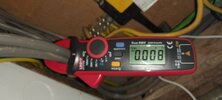The installation certificate would be applicable to what was installed in 1996.
If additions or alterations have been made since, then further documents should have been created for those when they were done.
Old documents do not need updating, they just record what was there at the time.
In some cases yes - but it's not going to happen for a consumer unit which is approaching 30 years old.
There is no 'pass' - it's either Satisfactory or Unsatisfactory.
If there are no RCDs at all, then it's highly likely a new consumer unit will be required.
Even in 1996, RCDs were required for socket outlets that were likely to be used for equipment outdoors - which generally meant those on the ground floor and in garages/outbuildings.
Thanks mate. Maybe they didn't install it in 1996 as we don't have a drive neither a garage , 4 bed terraced house with a basement and attic...
Aside from that certificate that's on the CU ... we don't have any other docs... but as a matter if curiosity how would anyone know whether the downlights in the attic were done a few years back or in 1996? I'd assume it will just feed off the same lighting circuit.
As a matter of curiosity what are the going prices for newer RCD CU? Guide prices.



